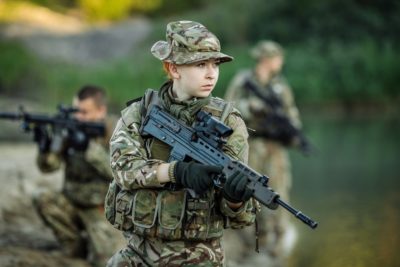Under-18s in army ‘face greater injury, death and mental health risks’
Guardian
Recruiting children aged 16 and 17 into the British army places them at greater risk of death, injury and long-term mental health problems than those recruited as adults, according to a new report.
Public health charity uses damning report to call for minimum recruitment age to be raised to 18
Recruiting children aged 16 and 17 into the British army places them at greater risk of death, injury and long-term mental health problems than those recruited as adults, according to a new report.
The public health charity Medact uses its report, published on Tuesday, to call for the minimum recruitment age to be raised to 18.
“Minimum age laws exist to protect children from smoking, drinking, driving and watching violent films,” said Dr David McCoy, director of Medact. “It’s time for the UK to fall in step with the vast majority of countries and raise the minimum recruitment age to 18.”
The UK is the only country in Europe, and only permanent member of the UN security council, to still allow recruitment from age 16. A nationwide poll in 2014 found that 77% of the general public support a rise in the recruitment age to 18.
The army’s policy of recruiting children has been strongly criticised by multiple UN and UK parliamentary bodies, child rights organisationsand human rights groups.
Despite the criticism, Medact found child recruits to the British army are more likely to be deployed on the frontline. In Afghanistan, British soldiers who enlisted at 16 were approximately twice as likely to be killed or injured when compared with soldiers who enlisted when they were over 18.
Child recruits are also more vulnerable to suicide, self-harm, post-traumatic stress disorder and alcohol abuse than adult recruits, the report found.
Steve Brown joined the army cadets aged 13 in 1995 and the army three years later. “I became a child soldier in the British army because they’d groomed me since the moment I joined the cadets,” he said. “The army turned up every couple of months with motorcycle displays and other spectacles, and promised us life in the army would be glamorous, fun and well-paid. There was no mention of the downsides, even at the recruitment office itself.”
Brown left the army after his second tour of Iraq in 2006. Now 35, he struggles with depression and post-traumatic stress disorder. “A decade after leaving the army, I’m still recovering from the damage it did to me,” he said. “I joined straight out of school, so didn’t have a chance to become an individual. When I left, I realised that I had never learned how to make my own decisions or have my own opinions. Because I’d joined so young, I had been completely moulded by the army and life outside was almost impossible.”
The army accepts applications from children aged 15 years and 7 months. In the last financial year, 22.2% of recruits were under 18. New recruits under 18 have to sign terms of service which can prevent them from leaving the army for up to six years.
McCoy said that how the UK armed forces recruits children breaches its own definition of “informed consent”. He said: “Full and informed consent of these children is not always gained. There are compliance issues with the Optional Protocol on the Involvement of Children in Armed Conflict, which the UK has signed.”
Young veterans, aged 16-24, are more likely to kill themselves when compared with the general population: between 1984 and 2013, male soldiers aged under 20 were 47% more likely to kill themselves than the same age group in the general population. “These findings are mainly a result of a higher prevalence of pre-service vulnerabilities amongst young recruits to the armed forces,” the report said.
The report comes after the defence secretary, Michael Fallon, announced that cadet army units would be expanded in state schools. While the government argues that the cadet programme helps raise pupils’ attainment, campaigners have expressed fears that these units act as a channel of recruitment into the armed forces, and that military activities for children as young as 12 are inappropriate in the educational environment.
Citing evidence that military marketing strategies which glamorise war “take advantage” of the tendency of adolescents to be driven by immediate social rewards and risk-taking behaviours, the report also accuses the army of not being truthful enough about life in the military.
See more: recruitment age, risks, Medact










